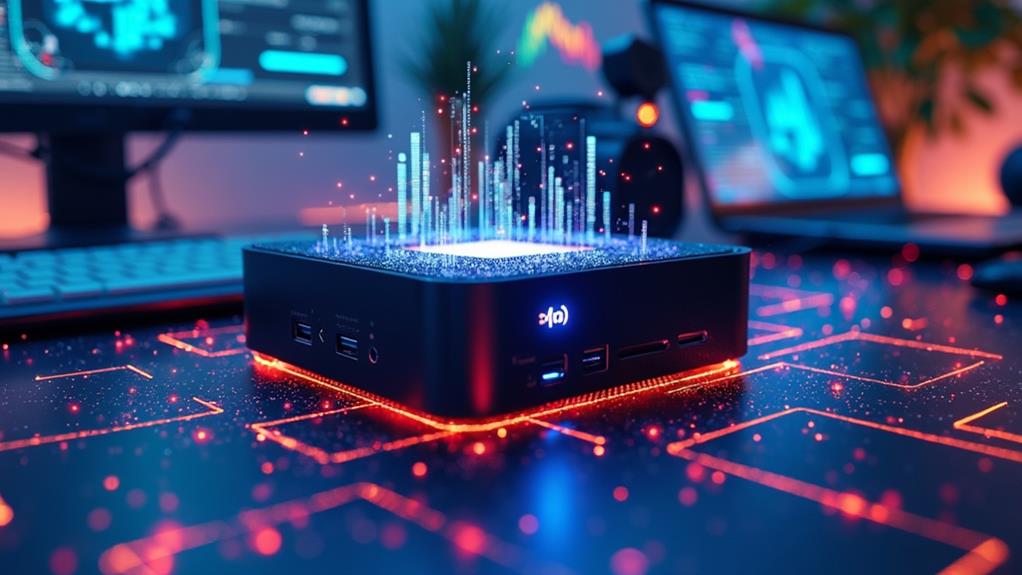



Isn't it amazing how these compact devices can tackle the behemoths of data with such finesse? As you ponder the intricacies of mini PCs handling large-scale data analysis, a world of strategic processing, clever storage allocation, and thermal innovation comes into play. For instance, whether it is leveraging the potency of multi-core processors or creatively utilizing storage solutions, these little workhorses can orchestrate complex computations. So, how exactly do they achieve this?
Key Takeaways
- Mini PCs utilize powerful multi-core processors for parallel processing and efficient data analysis.
- High-capacity hard drives and specialized software like GraphChi handle large datasets and enable faster data retrieval.
- Robust processing capabilities and software like Apache Spark and TensorFlow manage complex computations and large-scale data analysis.
- GraphChi distributes computational loads to mitigate memory constraints and access large datasets on personal computers.
- Data partitioning and out-of-core processing ensure efficient RAM allocation and maximize mini PCs' storage capacity.
Processing Power for Data Analysis
When implementing mini PCs for data analysis, powerful multi-core processors provide significant processing power to handle demanding data analysis tasks efficiently. These compact computers can be configured with high-performance CPUs like the Intel Core i7, which is particularly well-suited to handle tasks requiring heavy computing. For instance, data-intensive applications involving large-scale datasets can be processed locally, leveraging the parallel processing capabilities of mini PCs. This is pivotal for remote or resource-constrained environments where data transfer may be limited or unreliable.
By leveraging these robust processing capabilities, mini PCs can efficiently run specialized software like Apache Spark and TensorFlow. These tools are designed to utilize multi-core processing efficiently, making them ideal for handling large-scale data analysis tasks. Additionally, mini PCs can be configured with high-capacity storage options, ensuring the ability to accommodate sizeable datasets locally. This allows data analysts to perform complex tasks without relying on remote resources, thereby reducing latency.
The reliability and flexibility of mini PCs in data analysis, especially at the edge, make them a fundamental component in modern analytics infrastructure.
Storage for Big Data
Mini PCs can now be equipped with robust storage solutions to handle the vast amounts of data required for large-scale data analysis, ensuring that dataset sizes exceeding local RAM can be accommodated. One key advantage of mini PCs is their ability to leverage high-capacity hard drives to manage large datasets that cannot fit entirely in RAM. This is essential for performing efficient data analysis, especially when dealing with massive datasets.
In addition to high-capacity storage, specialized software like GraphChi can further enhance the efficiency of data access from hard drives. This software facilitates fast retrieval of data, thereby accelerating the computational process. By integrating such software with mini PCs, users can efficiently execute large-scale graph computations without the need for extensive and expensive infrastructure. Mini PCs, combined with robust storage and efficient software, can effectively manage and analyze vast datasets, making them a valuable tool for professionals in fields like computational biology, software development, and research startups.
Handling Complex Computations
You will need robust processing capabilities to handle the intricate complexities of large-scale data analysis. As the scale of graph-computing problems continues to grow, the ability to handle streaming graphs and model changing relationships over time becomes pivotal. Fortunately, advancements in technology have made it possible to perform complex computations on a personal computer. For instance, GraphChi software enables large-scale graph computations on a desktop computer by exploiting the storage capacity of hard drives. This allows for cost-effective solutions for companies and startups, enabling more innovation through accessible graph-computing tools. In fact, GraphChi can analyze Twitter's 2010 social graph with 40M users and 1.2B connections in just 59 minutes on a desktop computer. With such capabilities, you can tackle complex computations with ease, opening up possibilities for rapid DNA analysis, detailed brain mapping, and improvements to processes like bird flu vaccine production. By harnessing the power of GraphChi and similar tools, you can handle complex computations with ease, driving innovation and progress in various fields.
Data Access Methods for Mini PCs
Utilizing mini PCs for complex computations in data analysis requires efficient data access methods that can effectively manage the limitations of RAM by leveraging the storage capacity of hard drives, enabling faster and less random access through software like GraphChi. This software empowers mini PCs to overcome memory constraints and handle large-scale data analysis. For instance, GraphChi allowed the analysis of Twitter's 40 million user, 1.2 billion connection social graph in just 59 minutes on a personal computer.
By leveraging the storage capacity of hard drives, GraphChi enables faster and less random access to data, making desktop-based graph computation a viable solution. This is particularly beneficial for computational biologists, web developers, and companies that require large-scale computations and analyses. With desktop-based solutions, the reliance on cloud-based solutions or supercomputers is reduced, making computations more accessible and efficient.
As data sets and networks continue to grow, the importance of accessible graph-computing tools like GraphChi will only increase. These tools have the potential to revolutionize various industries and applications, including rapid DNA analysis for disaster victim identification, detailed brain mapping using machine learning, and improvements to processes like bird flu vaccine production. Consequently, efficient data access methods for mini PCs are essential for handling complex data analysis tasks effectively.
Leveraging Hard Drive Space
To distribute computational load and mitigate memory constraints, leveraging hard drive space in mini PCs effectively enables large-scale data computations. When dealing with massive datasets, personal computers often lack sufficient RAM to hold entire datasets in memory. However, by leveraging large hard drive storage capacities, mini PCs can still perform data-intensive computations efficiently.
Software like GraphChi, developed at Carnegie Mellon University, allows you to access hard drive data efficiently and run large-scale graph computations on personal computers. For example, GraphChi enabled the analysis of Twitter's 2010 social graph with 40 million users and 1.2 billion connections in just 59 minutes on a personal computer. This ability to perform large-scale graph computations on mini PCs provides a cost-effective solution for companies and startups, reducing their reliance on cloud-based or supercomputing resources.
As graph-computing problems continue to grow in scale, the ability to perform large-scale computations on personal computers becomes increasingly important across various industries and applications.
RAM Allocation for Large Data
Frequently, mini PCs face significant RAM constraints when handling extremely large datasets, necessitating innovative approaches to allocate memory efficiently for large-scale data analysis. When faced with the challenge of processing enormous datasets in limited RAM, mini PCs can leverage data partitioning and out-of-core processing to make the most of their storage capacity. High-capacity storage drives play an essential role in this process by providing the necessary space to store and access data quickly.
To push the limits of mini PCs, software solutions like GraphChi come into play. GraphChi can undertake computations on massive graph datasets, such as the Twitter's 40 million user, 1.2 billion connection social graph, in under an hour by exploiting the storage capability of personal computer hard drives. This advanced data access method allows GraphChi to efficiently handle large-scale data in a practical and timely manner.
Despite the RAM limitations in mini PCs, these innovative software solutions can still deliver powerful large-scale data processing capabilities for many real-world applications. By exploiting storage capacity and novel data access methods, mini PCs can effectively handle demanding data analysis tasks, proving their versatility in this field.
Innovative Cooling Systems
When considering mini PCs for data analysis, one of the key performance factors is the innovative cooling systems employed, such as silent solid-state active cooling, to maintain ideal performance without sacrificing compact size or power efficiency. These compact computers leverage advanced thermal management techniques, including heat sinks and thermal pads, to guarantee efficient heat dissipation during intensive computational tasks. Passive cooling and liquid cooling systems are also integrated in some models to enhance thermal control, allowing continuous high-performance operation in constrained spaces.
To maximize cooling efficiency, mini PCs are designed with carefully engineered airflow pathways and strategic component placement. This approach prevents thermal throttling and ensures that the operating system remains stable even under heavy computational loads. Additionally, intelligent power management and thermal monitoring systems dynamically adjust performance and cooling to maintain optimal operating temperatures and prevent overheating. These innovative cooling systems make mini PCs ideal for data analysis tasks where high performance and reliability are essential.
Overcoming Cloud Dependence
Using mini PCs for data analysis empowers you to break free from the costs and limitations of cloud-based computing solutions, providing a more scalable and accessible way to manage your data-driven projects. By leveraging powerful desktop-grade hardware and specialized software, you can process large datasets more efficiently using your own technology, rather than relying on cloud servers.
- Cost-Effectiveness: Mini PCs are generally more affordable than maintaining large-scale cloud infrastructure, allowing you to channel your resources towards actual data analysis.
- Data Storage: With ample local storage, you can keep your data close, reducing the need for costly and sometimes slow data transfer.
- System Control: By having full control over your mini PC system, you can tailor your environment to specific project needs.
- Offline Functionality: With mini PCs, you can work on your projects even without a stable internet connection, making them ideal for remote locations.
- Scalability: You can deploy multiple mini PCs to create a distributed data analysis network, expanding your capabilities as needed.
Frequently Asked Questions
Can a Mini PC Be Used as a Server?
"Yes, you can use a mini PC as a server. These compact computers offer robust server capabilities, efficient performance, low cooling requirements, versatile networking, scalable storage, robust security, and powerful virtualization, all m
Is a Mini PC Good for Programming?
"As the old adage goes, 'good things come in small packages.' For you, a mini PC is an excellent choice for programming, offering efficiency, seamless IDE performance, and streamlined coding workflows, all while integrating development, boosting productivity, and ensuring scalability and versatility in software development and application deployment."
What Is the Point of a Mini Pc?
You might wonder what the point of a mini PC is. Well, it offers energy-efficient performance in a compact design that's portable, versatile, and budget-friendly. Perfect for small footprint utilization, silent operation, and multimedia playback, it's a scalable, cost-effective alternative for various applications.
Is a Mini PC Better Than a Laptop?
If you need robust processing power, storage, and advanced cooling solutions, a mini PC is a better option than a laptop due to its high hardware capabilities, customization potential, and longer durability.
Conclusion
As you manage data analysis with a mini PC, consider it a strategic ally, like a commander in the heart of complex computations. By adeptly leveraging parallel processing and robust storage capabilities, you break free from infrastructure constraints and access tailored, cost-effective solutions. With innovation on your side, the small but fierce mini PC becomes a force multiplier in data analysis, empowering you to conquer even the largest datasets with precision and efficiency.
Disclosure: As an Amazon Associate, I earn from qualifying purchases.







